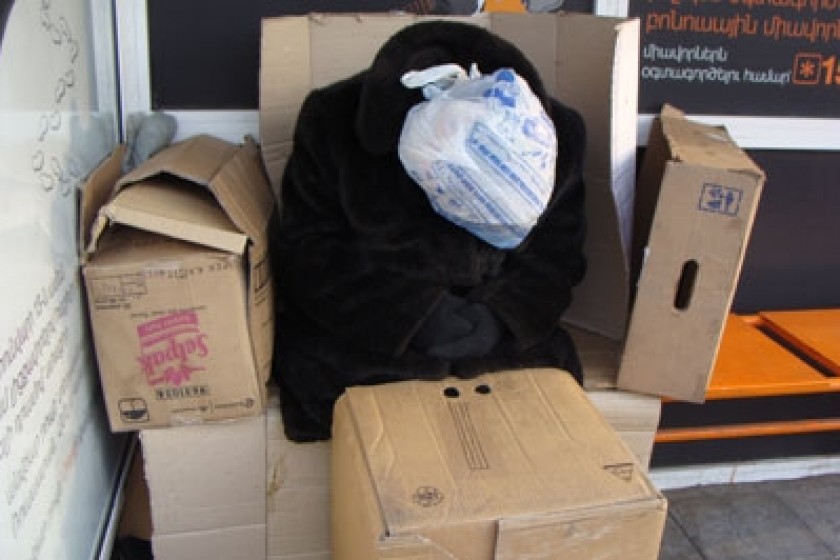
Grandma Rima Finds Shelter from the Cold
What about the rest of Yerevan's homeless women?
Grandma Rima ushered in the New Year huddled at a bus stop on Nalbandyan Street right off the festively lit Republic Square. She was shivering from the cold and couldn't move. Her speech was stuttered as she vainly tried to answer my questions.
The old woman could only remember the year she was born – 1935. She had no recollection of how long she was living on the streets of Yerevan, only that she had spent the past several nights in this bus shelter.
When I met her there, Grandma Rima had wrapped her legs with cardboard and there was a plastic grocery bag covering her head. She had tightly wrapped the coat she was wearing around her body, breathing underneath. This is how she tried to ward off the night's chill.
Haghtanak Shelter has no vacancies come winter
We had difficulty escorting her to the temporary homeless shelter in the village of Haghtanak. When we arrived, the shelter was full. It opened its doors back in 2006 with 44 beds.
The shelter's cleaning lady told us that during the winter months all the beds are taken. There are fewer applicants during the summer.
Luckily, a place was found for Grandma Rima that night. She's still there.
Her new neighbors told us that the woman appears to have psychological problems. It's the way she acts, they say.
Facility ill-equipped to deal with psychologically afflicted
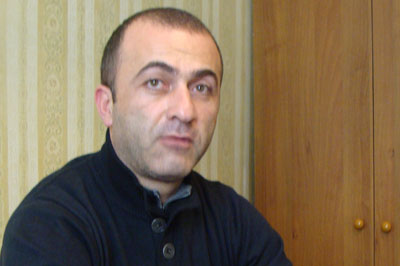 Hayk Poghosyan, the shelter's new director, told us that the staff has their hands full with residents who are mentally unstable.
Hayk Poghosyan, the shelter's new director, told us that the staff has their hands full with residents who are mentally unstable.
Mr. Poghosyan explained that oftentimes residents are sent to the shelter with a clean bill of health from the psychiatric unit. It's only after admittance that shelter physicians diagnose the patients as psychologically afflicted.
"Today, we have no legal options to employ. Presently, we house more than a dozen mentally unstable patients that really present a danger to the others and the staff," says Mr. Poghosyan.
In such cases, the shelter administration has to apply to the courts with the appropriate medical documents to register a specific patient as psychologically unstable. The country's psychiatric wards do not accept the diagnosis of doctors affiliated with such institutions like homeless shelters.
Armineh becomes a permanent resident
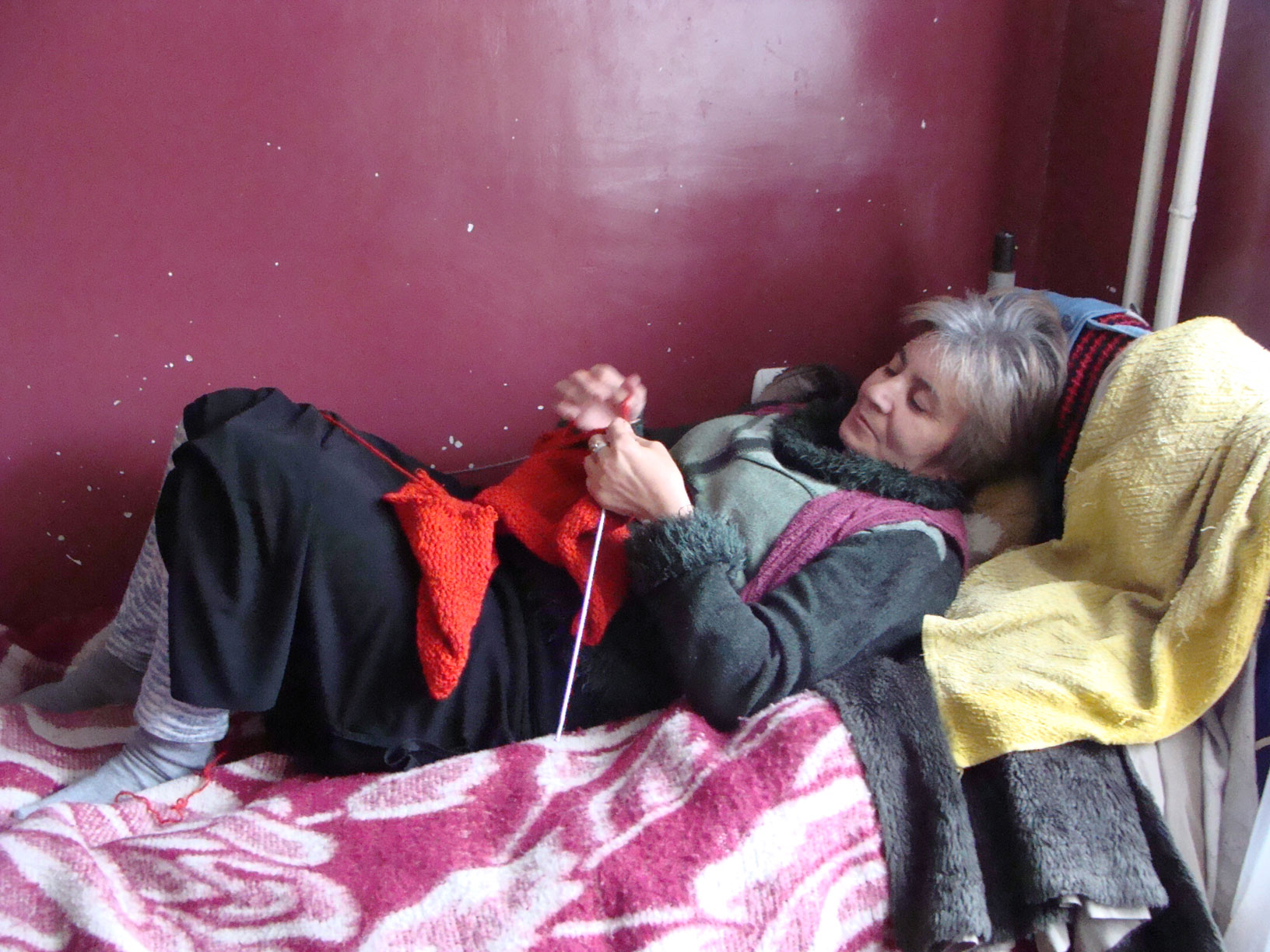 A patient can stay at the homeless shelter for up to two months. The building is centrally heated and residents get three meals daily plus a weekly shower. The shelter also provides clothes, if necessary. Men and women live in separate wards. For many residents, the temporary shelter has become their permanent home.
A patient can stay at the homeless shelter for up to two months. The building is centrally heated and residents get three meals daily plus a weekly shower. The shelter also provides clothes, if necessary. Men and women live in separate wards. For many residents, the temporary shelter has become their permanent home.
For the past three years, Armineh Poghosyan has been knitting with the same red thread and then taking the pattern apart.
"I have nothing else to do," exclaims the 51 year-old woman who graduated from the Philological Faculty at Yerevan State University. Armineh once worked at a library but was let go. She then privately tutored students for awhile. The family house was sold by her sister and her brother-in-law. With the money they opened a store and sent Armineh here, to the temporary shelter.
Armineh's relatives had promised her that they would build a new house and give her a place to stay. The women told us that her relatives are still renting; the new house has yet to be built.
Her neighbors at the shelter tell a different story. They say the relatives have tricked Armineh – they have a house but just don't want to take care of her.
Armineh's pension also goes to her sister. It appears the homeless woman doesn't get a cent of it. Armineh still believes her sister will send for her once the house is built.
"All I have here is this bed and a few clothes. But I once tutored students. Did I tell you I graduated from university?" says Armineh. "These rooms are only for two months. It's hard to stay here. The room gets stuffy and hot. Then again, I have nothing in common with the other residents. I get real lonely."
Mrs. Lydia, another shelter resident, chimes in, "What I wouldn't give for a backgammon board. I'd roll those dice like there was no tomorrow."
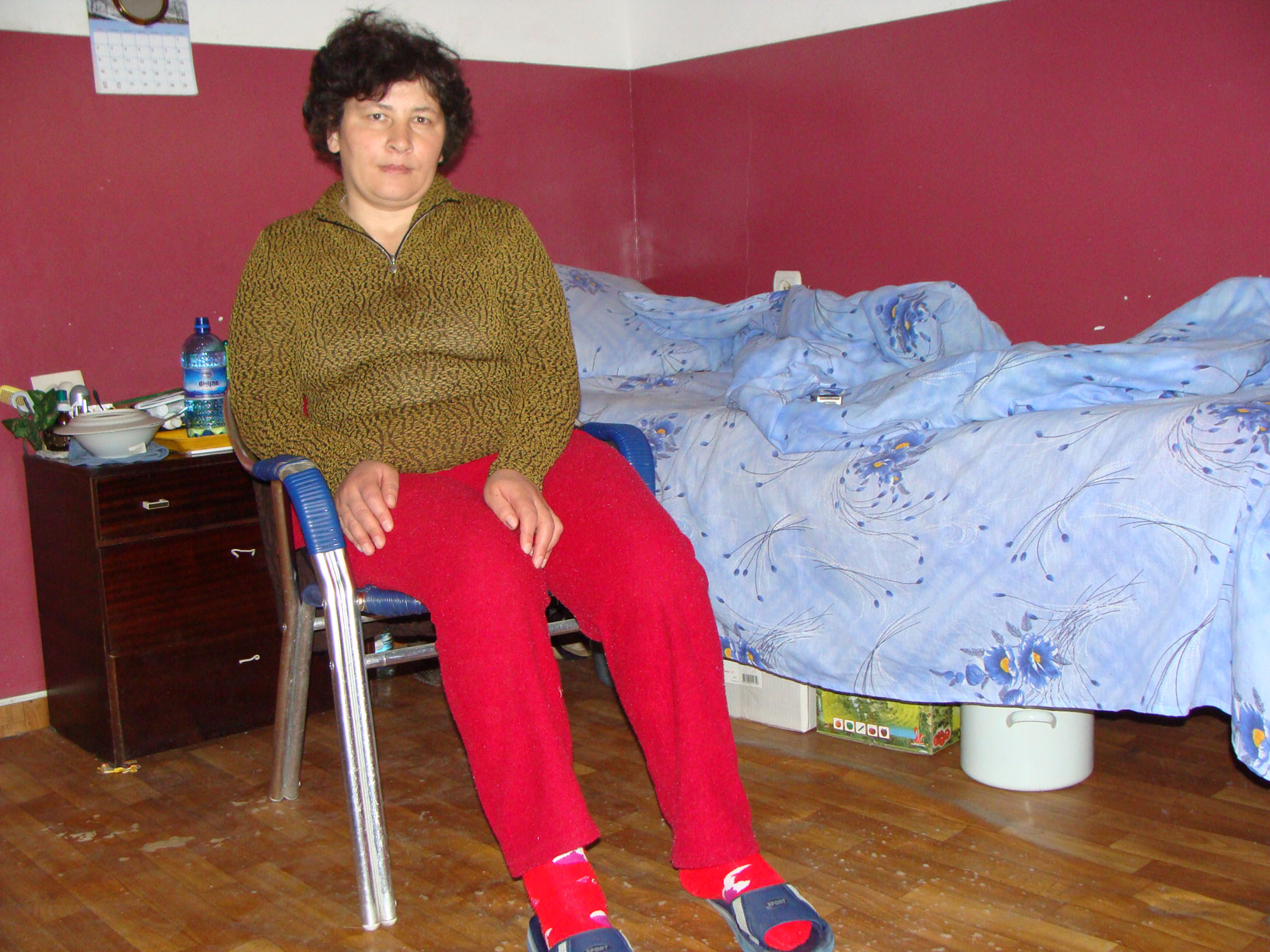 41 year-old Armineh Ivanyan is another resident at the shelter. She's been there four years now. Once married, she now proudly shows us photos of her children saved in her cell phone. Her children are now in college and frequently visit her at the shelter.
41 year-old Armineh Ivanyan is another resident at the shelter. She's been there four years now. Once married, she now proudly shows us photos of her children saved in her cell phone. Her children are now in college and frequently visit her at the shelter.
Armineh gets around with difficulty. Her speech is strained. When I ask what happened, she remains silent. Going to the closet, Armineh pulls out a stack of documents, photos and old newspaper clippings. There's an article dated 2001 about a series of tragic incident that took place in the Shenatagh village in the Sisian region. Her brother was also involved.
Afterwards, Armineh fell ill and the doctors still haven't been able to diagnose the problem. Her husband remarried. After several rounds of prolonged treatment at various hospitals, Armineh was sent to the shelter.
Her son, now a sophomore at college, promises to get her out once he's found a job and a house.
Akhalkalak woman left outside shelter by relatives
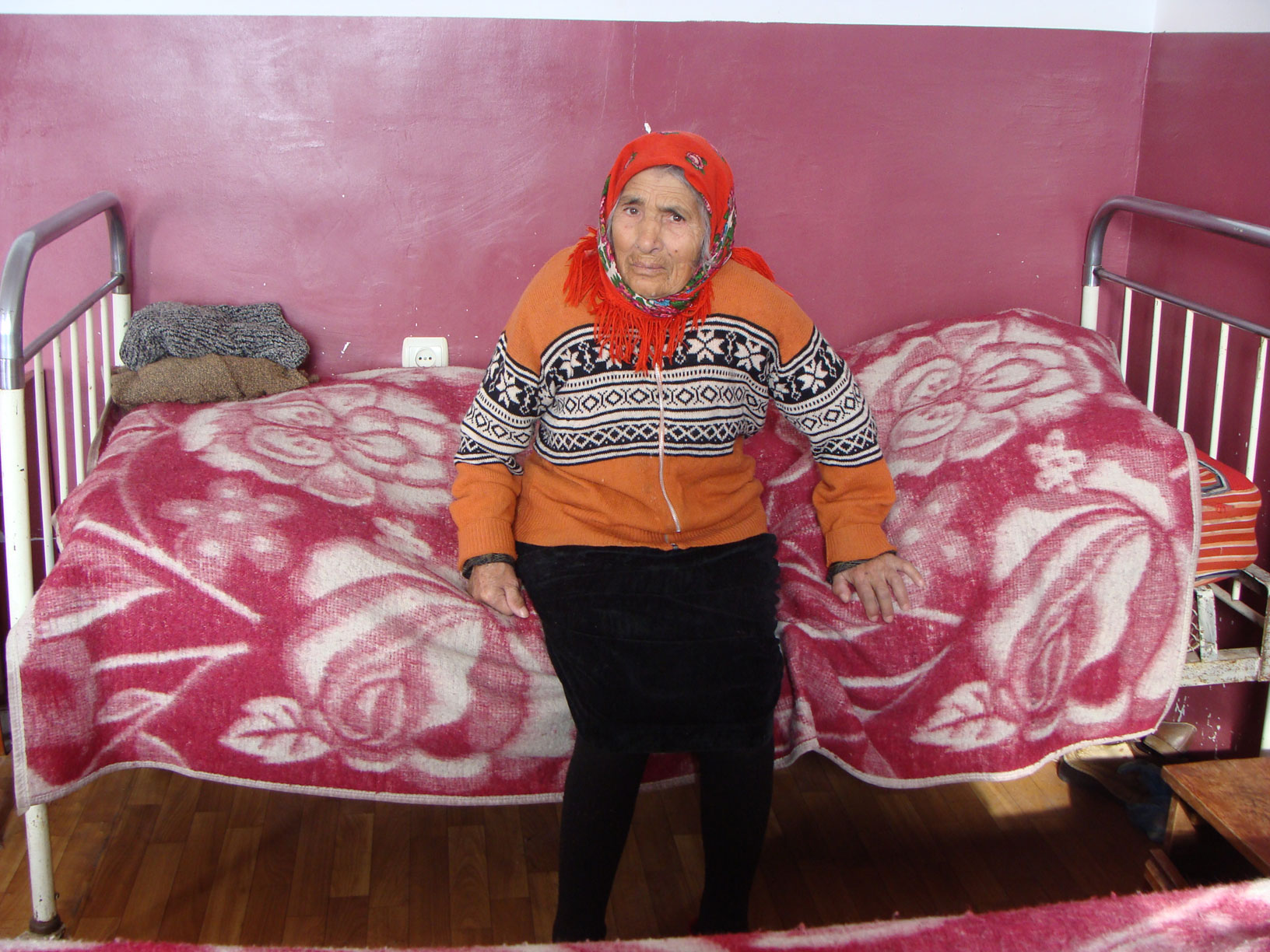 Ofik Ktryan has wound up at the homeless shelter as well. The woman is originally from the Olaver village in the Akhalkalak region.
Ofik Ktryan has wound up at the homeless shelter as well. The woman is originally from the Olaver village in the Akhalkalak region.
"I'm going on 60 years. I don't know for sure; I've forgotten. How old are you? Nah, you're a youngster," asks Mrs. Ktryan in her Javakhk Armenian dialect.
When I ask her what circumstances had forced her to enter the shelter, Ofik says that she was brought her. Other residents say that she was the second wife of her husband and that they don't have any kids. They claim that the husband's son from his first marriage drove Ofik to the shelter one day and left her outside the door.
The woman says she still has relatives in Olaver but that she prefers to stay at the shelter.
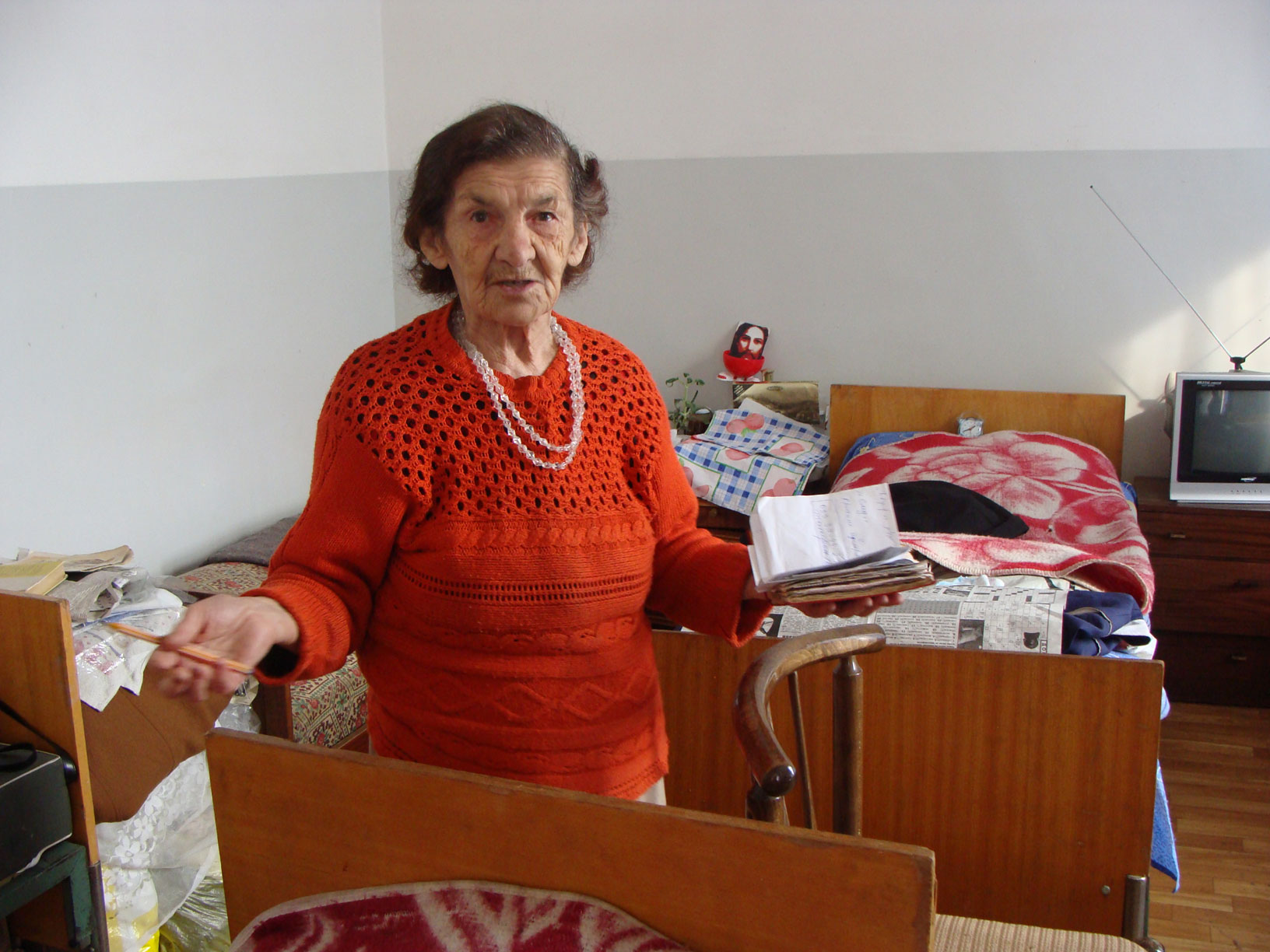 Zhena Movsisyan lived in the "Monument" neighborhood of Yerevan for fifty years. Afterwards, she and her brother found refuge at the shelter.
Zhena Movsisyan lived in the "Monument" neighborhood of Yerevan for fifty years. Afterwards, she and her brother found refuge at the shelter.
She told me that her brother's son had taken out a $2,000 loan which he couldn't pay back. He had put the family garage down as collateral. The creditors took the apartment instead. Zhena one day found herself on the street. The case is dragging on in the Court of Cassation. The woman still hopes for redress.
Rostov mother and daughter have no options
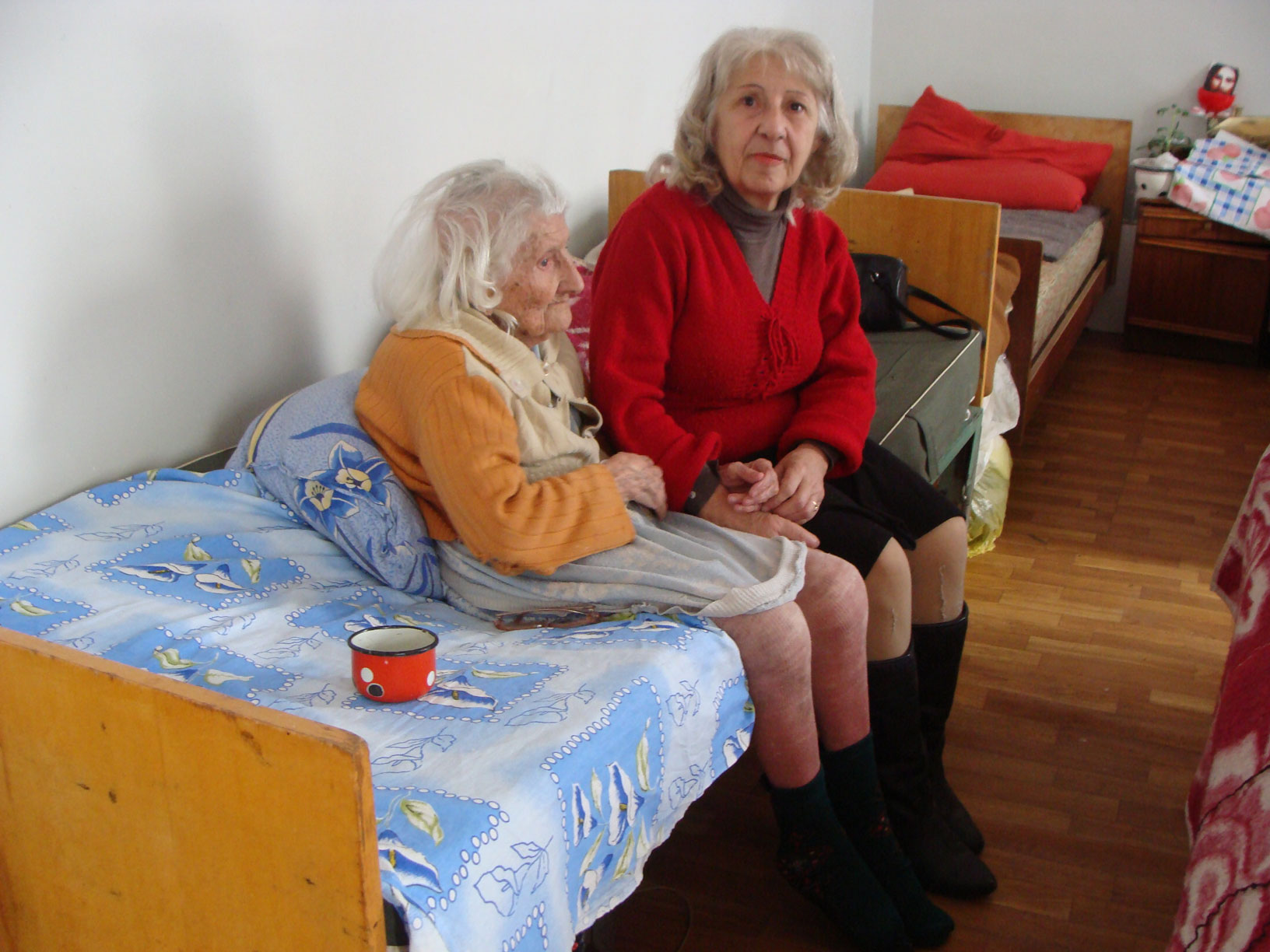 Mother and daughter, Vardoush and Hratzin Palandjanyan originally moved to Rostov from Armenia seven years ago. They sold their apartment in Avan and moved to Russia. They had to return to Armenia because their emigration papers had expired and they couldn't register for residency in Russia.
Mother and daughter, Vardoush and Hratzin Palandjanyan originally moved to Rostov from Armenia seven years ago. They sold their apartment in Avan and moved to Russia. They had to return to Armenia because their emigration papers had expired and they couldn't register for residency in Russia.
Their daughter-in-law paid for their tickets and sent the two back to Armenia. They landed at Zvartnots Airport with no place to go. Police officers sent Hratzin and Vardoush directly to the shelter. This happened 18 months ago. They're still here.
Vardoush is now 90 years-old and can't see anymore. Hratzin takes care of her.
"I can't find any work at all; not even as a cleaner. I want to see Tigran Karapetyan. Who knows? Maybe he'll help us out with some money or something if I tell him our story. I'd go back to Rostov and get our migration card. At least we could stay at some Russian old-age home," Hratzin says.
Residents at the shelter don't have any complaints about the food.
The New Year's table was chock full of goodies – salads, cakes, grilled meats and champagne. They all had a good time.
The rest of the time, conditions aren't so pleasant.
The women tell me that many of the male residents pass the time hitting the booze and getting drunk. Oftentimes, in their alcoholic stupor, they quarrel with the women and verbally insult them.
There are also sanitary concerns to be taken care of. Mrs. Lydia says that many residents take it upon themselves to keep the rooms clean even though there are staff attendants on hand.
"Some of these people have been living on the streets. If a woman with lice is assigned to the bed next to me, then I have a problem too. I make sure the place stays clean," says Mrs. Lydia.
New director focuses on security and nutrition
The shelter regulations are pretty lax when it comes to what residents can and cannot do. The doors close at 10 pm and no one can leave or enter after that.
There was a meeting of the shelter staff and administration on January 11.
Hayk Poghosyan, a member of the Prosperous Armenia Party, who was appointed to replace Samvel Tadevosyan on January 1, spoke about changes he wanted to implement.
Alvard Hakhverdyan, one of the shelter's cleaning attendants, told us that the director wanted to tighten up on the shelter's code of conduct.
Director Poghosyan told me that anyone found to be abusing alcohol would be evicted from the shelter. He also said that the quality of meals had been improved and that other reforms were on the way.
With the assistance of the United Nations, a medical unit was planned for the shelter.
The outside grounds would continue to be landscaped with shrubs and trees.
Those residents seeking spiritual solace will also be glad to know that the Holy See of Etchmiadzin will assist in the renovation of the shelter's chapel.
 Videos
Videos Photos
Photos




Write a comment